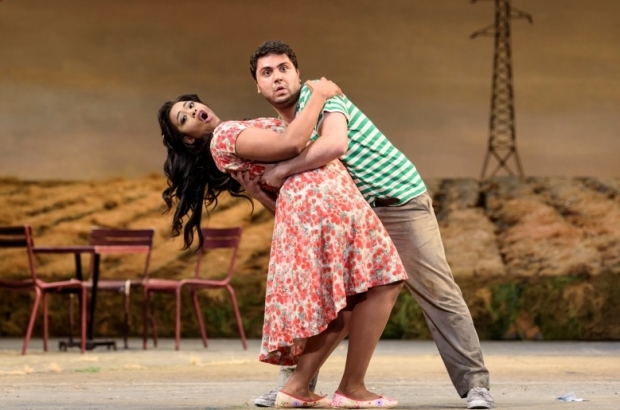Review: L'elisir d'amore (Royal Opera House)

© Bill Cooper
Remember the name: Liparit Avetisyan. Well at least try to, because that way you'll be ahead of the game when he becomes a star. For the Royal Opera's latest revival of L'elisir d'amore the young Armenian has stepped into shoes vacated last month by the indisposed Rolando Villazón and, in true 42nd Street fashion, he walks off with the show.
For a singer whose bread and butter appears to be romantic tragedy – the tenor's CV is awash with Bohèmes and Traviatas – Avetisyan's merry turn as the naïve Nemorino is a delight. The layers of his performance embrace everything from pathos to pratfalls, like a singing Charlie Chaplin in glorious Technicolor. His instrument may be standard in tone and timbre, but the colour with which he used it had me holding my breath. His nakedly truthful delivery of "Una furtiva lagrima", Donizetti's best-loved aria, was a tour de force.
The titular elixir of love may be nothing more than some cheap claret peddled by the itinerant quack Dulcamara, but it is also the opera's maguffin for resolving a potentially tricky love triangle in which Nemorino and the Gaston-like Sergeant Belcore (Paolo Bordogna, very good indeed) vie for the heroine's affections. Factor in a last-minute windfall and a swift happy-ever-after, and the opera's froth speaks for itself.
Laurent Pelly's 1950s setting evokes a bucolic, Fellini-esque Italy of Vespas and cornfields where small dogs scoot and huge lorries chug past a wayside trattoria amid the hayricks of Chantal Thomas's sun-drenched designs. Poverty and ignorance are also hinted at, appropriately, since they are issues that drive the plot.
'Radiant voice and intelligent singing'
Much pre-show chat had surrounded Pretty Yende's house debut as Adina, the object of Nemornio's hopeless love, and indeed the South African produced a charming comic turn. In early scenes her smile brought the sun out, but there was insufficient depth to her subsequent journey towards self-discovery. Adina is a one-dimensional role that challenges the soprano to build some sense of a hinterland. With Yende, despite her radiant voice and intelligent singing, the character remained surface-deep.
As for Dulcamara, he may be a rogue but we still ought to warm to him. Alex Esposito's immediate predecessors in Pelly's production, Ambrogio Maestri and Bryn Terfel, maintained a high likeability quotient, but for some reason the Italian baritone played him here like Steven Berkoff's attack dog. There was no mellowness to his singing, nor much sign of a twinkle in his eye. Well, it's a view. The trouble is he tipped the prevailing mood off balance. It's unfortunate that Daniel Dooner, who has directed this revival with such flair and care, appears to have sanctioned this interpretation.
The Royal Opera Chorus peopled the village with a characterful sponteneity that was excised at the curtain call by the curious fruit-machine arm-lever with which new chorus master William Spalding regiments their bows. Someone needs to have a word with him about this. Bertrand de Billy, on the other hand, seemed far more relaxed than he did earlier this month when conducting Verdi's Don Carlo. For Donizetti, he opened the music's curtains and let the light stream in.
L'elisir d'amore runs in repertory at the Royal Opera House until 22 June.










